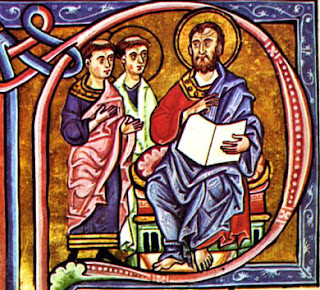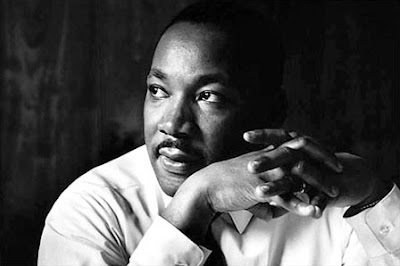The Church of St. Paul and Incarnation, Jersey City NJ
January 31, 2021
Year B: The Fourth Sunday after the Epiphany
Deuteronomy 18:15-20
Psalm 111
1 Corinthians 8:1-13
Mark 1:21-28
Restoring the Garden
You may remember that in a sermon a couple of weeks ago I took us all the way back to the beginning of the Bible, back to the garden, back to the first humans.
Those first humans did one of the most human things of all: they did the exact thing they were told not to do.
When I look out at our seriously messed up world, I often think back to that story – a story, which, even if not factual, is most definitely true.
We have made things way more difficult than God intended.
God offered us the world and invited us to work together in harmony, shaping and tending the garden – to be, in a way, co-creators with God.
But, by creating a real life, free, flesh and blood, world, God must have known that there was a good chance, even a likelihood, maybe even a certainty, that things would go horribly wrong.
God must have known that we would turn away from God and instead worship the false gods of selfishness and violence.
God must have known that unclean spirits would enter the garden, in and through us.
To be honest, it amazes me that, despite knowing the great risk, God still went through with creation – and that when we messed up – when we continue to mess up – God doesn’t give up on us – God doesn’t just move on to the creation in the solar system next door, hoping for a better result over there.
No, despite the risks, and for reasons known to God alone, God sticks with us, working to cast out the unclean spirits from the garden – inviting us still to be co-creators, to restore the garden back to what was intended from the beginning.
Here in church, this year we are reading a lot from the Gospel of Mark.
Most scholars agree that Mark is the earliest of the gospels, completed right around the year 70.
It’s also the shortest, most barebones of the gospels.
And, because it’s so quick and to the point, Mark always sounds so urgent. It’s like the evangelist just couldn’t wait to tell the story.
And, because Mark is so spare, it’s easy to recognize what he thinks is most important about the story of Jesus.
And, high on that list is the fact that Jesus is a miracle-worker, and, in particular, Jesus is an exorcist. He casts out unclean spirits.
For the past couple of Sundays, we’ve heard Jesus calling his disciples – Philip and Nathanael and the two sets of fishermen brothers – Jesus has been assembling his team, but now that’s done and Jesus is ready to get to work.
And, for Mark, Jesus’ work begins with the passage I read for us today.
Jesus teaches with authority, wowing everyone in the synagogue.
Suddenly, a man with an unclean spirit appears and cries out, “What have you to do with us, Jesus of Nazareth? Have you come to destroy us? I know who you are, the Holy One of God.”
Now, let’s stop right there for a minute and look at this a little more closely.
It’s interesting that the man with the unclean spirit appears in the synagogue. On the one hand, this might be a reminder, as if we needed one, that there are indeed unclean spirits in the church.
But it could also be a sign that the man with the unclean spirit knows that he needs help and so he goes to the one place, to the one person, who can help him.
I’m reminded of Pope Francis’ vision of the church as a field hospital, the place where the spiritually sick and wounded come for healing.
And the other thing about this scene is that, while the disciples often struggle to figure out exactly who Jesus is, and his own family worries that he has lost his mind, the unclean spirits – the demons – they know exactly who Jesus is:
The Holy One of God.
And so, Jesus performs his first sign in the Gospel of Mark. To everyone’s amazement, Jesus “rebukes” the unclean spirit, “Be silent, and come out of him!”
And this poor suffering man was restored to health.
I realize that all this talk of unclean spirits and exorcisms might make “modern, enlightened” people like us skeptical or nervous.
I feel the same way.
It’s true that people in ancient times had a much different understanding of illness.
And it’s also true that we are in the middle of not just a Covid pandemic but also a mental health crisis, all requiring professional medical attention.
At the same time, I think we can all agree that there are certainly evil powers on the loose in the world - powers that tempt us to look away from our common humanity, to forget that we are sisters and brothers, meant to nurture God’s beautiful garden together.
There are evil powers on the loose in the world – powers that drive us to selfishness, complacency, fear, and even violence.
And, unfortunately, because of movies and TV shows, we might think that we need some special training or that we need to use some kind of magic words and hand gestures or in order to cast out these demons.
But that’s not so.
Jesus was able to cast out the demons not because he knew the right words, but because of who he is: pure light, pure love.
It’s light and love that that cast out shadows and evil.
As St. Paul wrote to the Corinthians, “Love builds up.”
And, today, through us, the light and love of Jesus is still casting out unclean spirits, right here and right now.
For example, Triangle Park.
I have lived most of my life here in Jersey City, so by now, as they say, I go back quite a ways.
And, for as long as I can remember, Ferris Triangle Park, tucked away in the middle of Greenville, has been neglected – forgotten, really – seen as a problem, as a place beyond repair and redemption. For many years, the park and much of the neighborhood around it, was seen as the kind of place you should avoid if at all possible.
And all the many good people who lived around there were on their own, struggling to eke out a decent life for themselves and their families.
The park itself could barely be called a park, more like a paved-over patch of land, usually occupied by young guys dealing drugs not because it made them rich but because there really weren’t any better opportunities available.
It’s an ongoing challenge for us to build relationships with those guys, to see if we might be able to help them find a better way of life.
But, despite the mess we made of Triangle Park, for reasons known to God alone, God sticks with us, working to cast out the unclean spirits from the garden – to cast out the unclean spirits from our hearts - inviting us still to be co-creators, to build the garden that was intended from the beginning.
As most of you know, a couple of years ago the Episcopalians of Jersey City took a risk and opened a storefront community center, right across the street from the park.
After a while, the center became a beacon of light and love in that long neglected place, and, almost without us realizing it, the restoration of the garden was underway.
Today the center is busy every weekday, providing food and diapers and formula, sharing needed information, and much more. It’s a place where all are welcomed as brothers and sisters, just as it was always meant to be.
Lately, I’ve been at Triangle Park several times a week delivering all sorts of donations that you, our parishioners, have given.
But, it’s not just parishioners.
The other day, Amy Wilson, a local artist and community leader, got in touch with me, asking if I knew anyone who needed diapers.
I said, I sure do. And, I’d be happy to come by and pick them up and take them to the center.
Well, she then asked me to meet her at a warehouse, which should have been my first clue that this was not going to be a typical donation.
She brought me to a storage unit, which contained a pallet of diapers, a pile of donations that she had collected from lots of generous people. My first thought was that my vintage Honda Fit was not going to be able to handle all of this. She asked for help from one of the workers who brought the machine that lifted the pallet, moved it to the freight elevator, and down to my car.
We loaded boxes of diapers into just about every square inch of the Fit except the driver’s seat, managing to get most, but not all, of them in.
When I got to the center, all of the men were elsewhere so two women and I carried the diapers from my car, and, you know, despite the cops in the squad car watching over this place where there has been so much violence and suffering, despite all of the sadness of our city and so many of its people, the three of us were so joyful, making all of those trips back and forth across Old Bergen Road, dodging cars and buses, carrying diapers, shining light and love.
When we were done, I took a minute to look at Triangle Park.
Largely thanks to the tireless advocacy of Grace parishioner, Episcopal Jersey City leader, and unstoppable force of nature, Joyce Davison, Triangle Park is being reborn.
A couple of weeks ago, the city erected a chain-link fence around the park, and removed all the old broken concrete and the scraggly half-dead trees. By now, everything is gone except the beautiful monument to the war dead.
This little triangle-shaped plot of God’s garden is about to be transformed into something beautiful – into land the whole community can use and be proud of – closer to what God has always intended.
The unclean spirits of fear and despair are being cast out – we are restoring the garden - not because of some kind of magical words, but thanks to the light and love of Joyce and the people at our center and others in the community.
Just like two thousand years ago, the unclean spirits are being cast out by the light and love of Jesus.
Amen.















